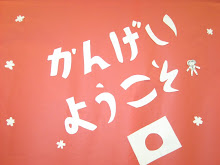Friday, April 30, 2010 An Eight Period Day
JAPANESE 3 -- First period
On board:
Example sentences:
マーセーデス は ニュース が 好き で よく 見る。でも ケーティー は あまり ニュース を 見ない。マーセーデス も ケーティー も テレビ で スポーツ を ぜんぜん 見ない。
We looked again at handout which explained how to interview about TV watching habits. Students looked at their own writing and at their partners to get ideas and see how they could improve. かきなおして (rewrite, write and fix)下さい。 Continue on to interview about reading habits and listening habits and write up the results (page 74 of handout).
Homework is writing up those results and preparing questions on lesson 6, so we can review Monday for comprehensive quiz on Tuesday.
Continuing our work on uses of the plain form (besides speaking informally with your friends)
DON’T FORGET --
To go somewhere (in order) to do something:
Destination へ Or に + verb stem (just take off the ます ) + traveling verb。
Example sentences:
あさごはん を 食べ に レストラン へ 行く。
I will go to the restaurant (in order) to eat breakfast.
ホットケーキ を つくり に うち へ かえる。
I will return home (in order) to make pancakes.
本 を かえし に としょかん へ 来ました。
I came to the library (in order) to return books.
Be sure to register with Japanese site on Moodle.
JAPANESE 1 – Fifth period。
Don’t forget sentence structure:
Time に Topic/subject は Destination に Traveling Verb
Time に Topic/subject は Direct Object を Active Verb
Checked homework: page 111 in workbook
Homework is poster for family members –
Choose 5 family members; give information about names, ages, likes, where they went on the weekend, what they did, and how it was (6 sentences) – we wrote these sentences in class.
Then create poster at least 9” by 12” (unlined paper) with an image for each family member, plus the 6 sentences. Due Monday.
Reminder:
Traveling verbs:
いきました、いって Went
きました、きて Came
はいりました、はいって Entered
かえりました Returned (home)
Family words, i.e. kinship terms:
ちち、おとうさん、おかあさん、おばあさん
New adjectives, and in the past tense!
あたらしい です。 あたらしかった です。Is new. Was new.
あつい です。 あつかった です。 Is hot. Was hot.
たのしい です。 たのしかった です。 Is enjoyable.
Was enjoyable.
Be sure to register with Japanese site on Moodle。
JAPANESE 2 Sixth Period
Three patterns:
__て も いい です か。 May I? Is it OK to?
はい、__て は いい です。Yes, it is OK to…。
いいえ、__て は だめ です。No, it is forbidden to…
We listened to Kikimashou for this lesson.
Work on kanji pages and katakana page for this lesson.
Review grammar – comprehensive test Monday
Explanation about あります(group 2 verb) —existence for inanimate things, things that cannot move themselves (even trees), where as います (group 2 verb) is existence for animate things (people and animals)
シアーズタワー の 上 に ヅカイ・ボックス が あります。
シアーズタワー の 上 に ともだち が います
Collected homework, which was to translate page 84 into English
Be sure to register with Japanese site on Moodle。
Reminder: We all must be polite in the Japanese language classroom. Not only is it important in our lives in general – it is an essential part of Japanese culture. ください、おねがい します、ありがとう、すみません Are the most important words and phrases in Japanese.
JAPANESE 4 and AP – Seventh period
****AP Japanese practice test will take place at 5 p.m. on Saturday, May 1st, in room 114. We will order pizza and drinks to sustain us.*****
Homework—postponed to Monday:
Pages 168 and 169 in “Strive for a Five”、prepare to give a 2 minute speech
For listening practice AP and Jpn 4 students listened to lessons from 3 Kimono, later lessons.
Tommy Y. gave his presentation Friday, April 30th. [“Presentation should be 4 minutes long – they are big topics. AP and 4th year people should supply Japanese vocabulary lists to everyone in the class. Students may speak from notes, but not from text-with-sentences.”]
Cultural topics that were chosen for presentations – 四年生の日本語の生徒、英語で(But with 単語のリスト)――AP の生徒、日本語で (単語のリスト)
Jenny J. – “Self, family, and friends”
Connie Y – “leisure – traditional arts, hobbies, and sports)
Tommy Y – “Nature and environment”
Amy Z – “School and education”
Mike S – “Clothing, 和服、洋服)”
Azrieal W – “Communication and media”
Elizabeth A – “Technology – internet, private and public phones, cell phones”
Lalita A – “Rites of life – weddings, funerals, gift exchanges, letters”
Anton H – “Transportation – Japanese trains, buses, bicycles, cars”
Johnny C – “Shopping – kinds of stores, vending machines, Jpn money”
Jerome M – “Folklore, traditional culture, legends and stories”
Subscribe to:
Post Comments (Atom)

No comments:
Post a Comment